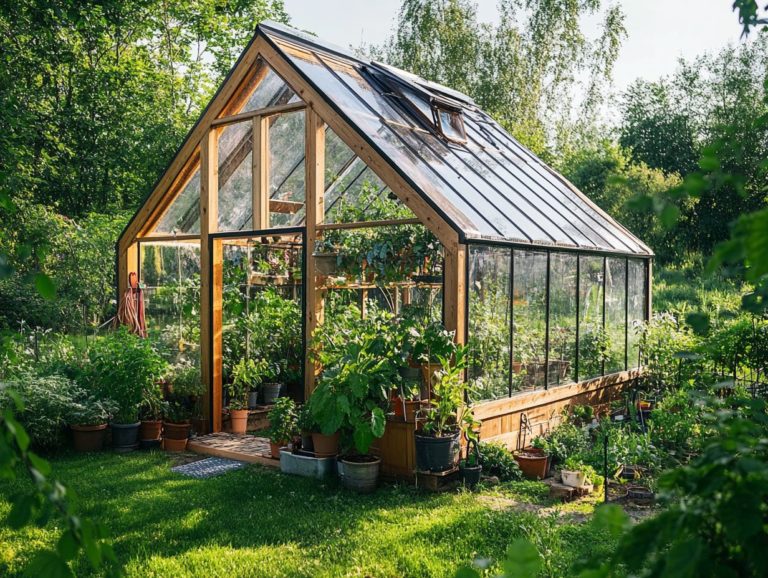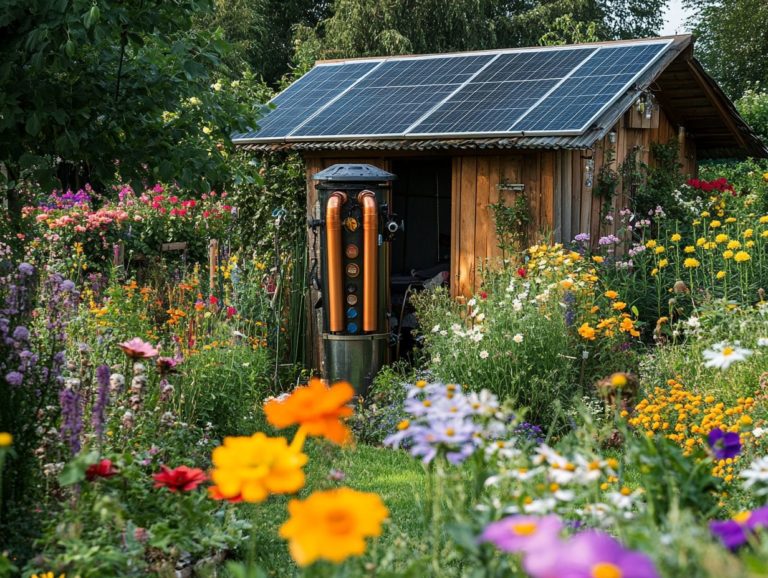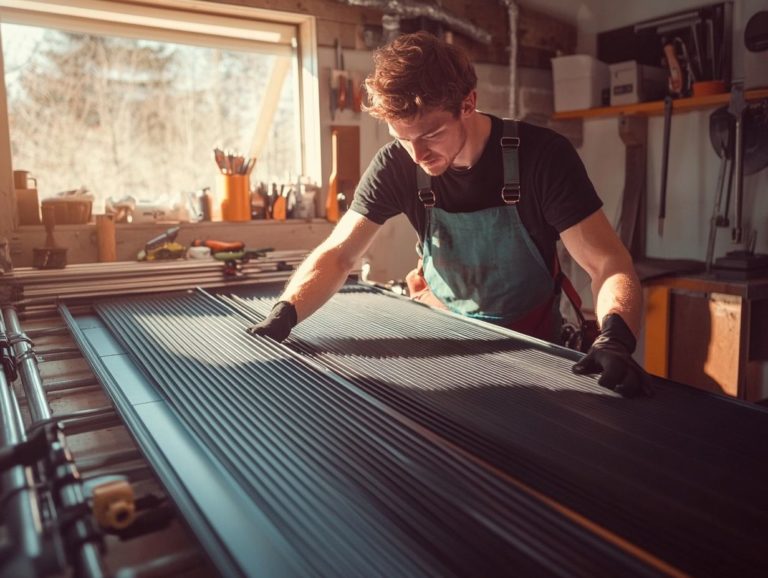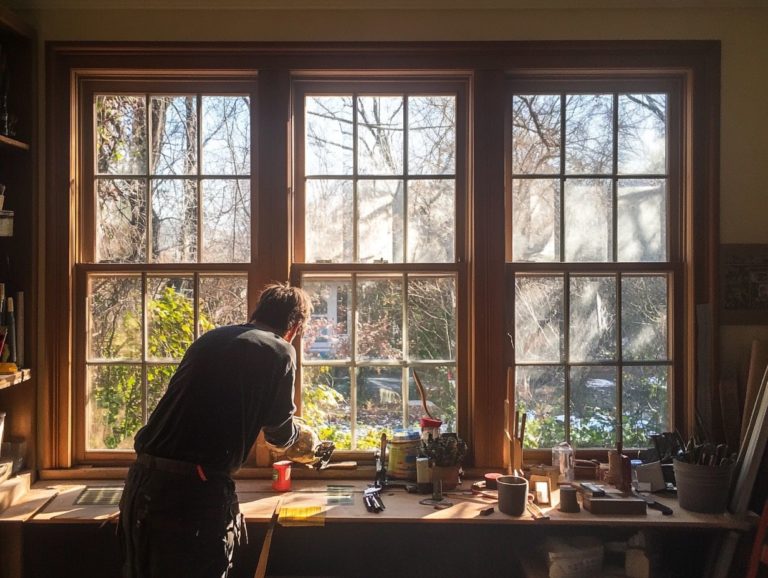DIY Projects to Create a Zero-Waste Home
Embracing a zero-waste lifestyle not only benefits the planet but also opens the door to significant savings and a more organized home.
This exploration unveils the numerous advantages of adopting a zero-waste approach, highlighting both environmental impacts and financial perks.
You ll discover engaging DIY projects that empower you to create homemade cleaning products, repurpose everyday items, and embark on composting all while effectively reducing food waste.
You ll also find practical tips to maintain your zero-waste journey for lasting success.
Start your zero-waste journey today! You ll not only help the planet but also enjoy some fantastic benefits.
Contents
Key Takeaways:
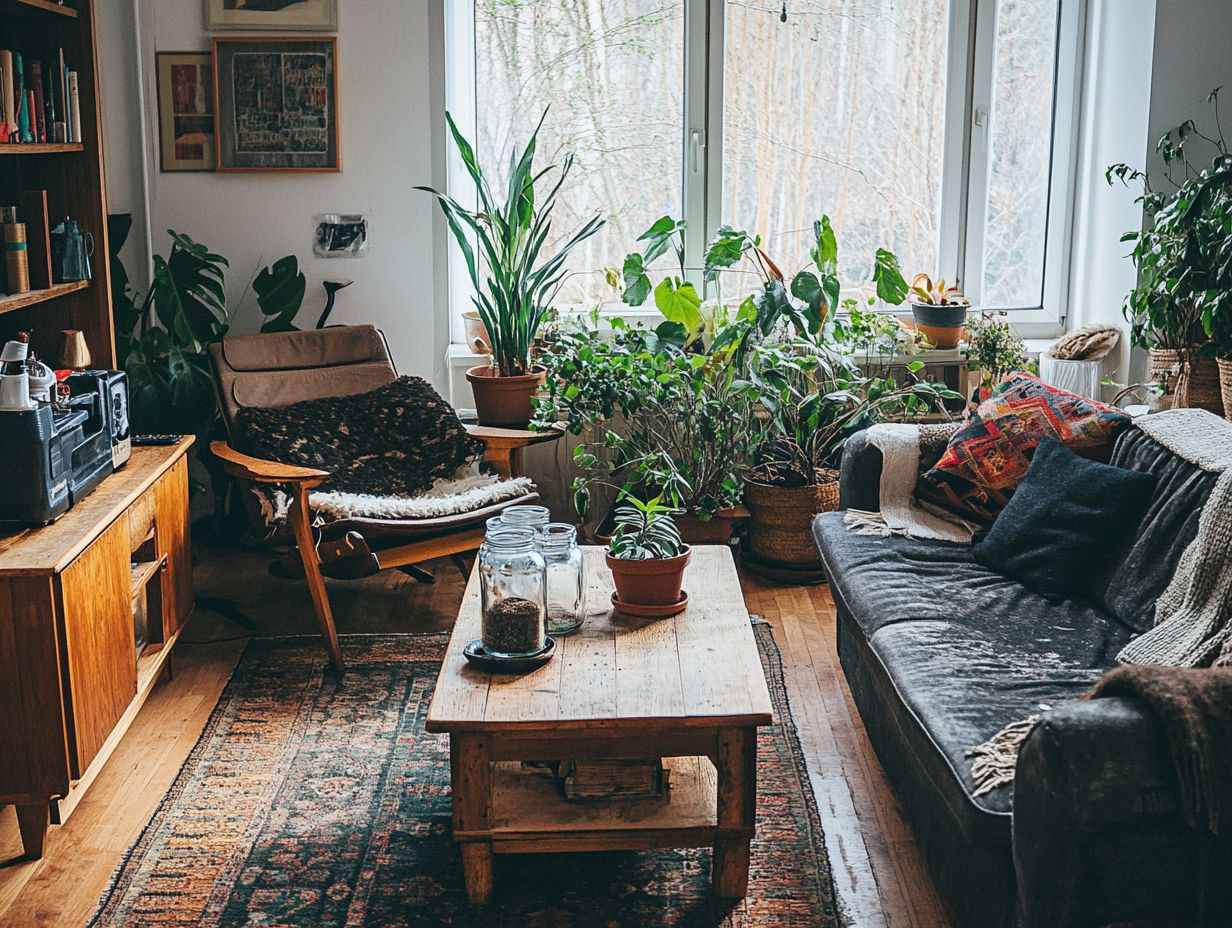
- Reduce waste and help the environment by creating a zero-waste home.
- Save money and reduce your carbon footprint by making your own cleaning products and repurposing household items.
- Maintain a successful zero-waste home by implementing practical strategies such as composting, gardening, and reducing food waste.
Understanding the Concept of Zero-Waste
Zero waste means aiming to prevent waste instead of managing it. This involves thinking carefully about what you buy and how you use resources.
This approach encourages you to rethink your relationship with resources. It pushes you to discover innovative ways to minimize waste generation.
By emphasizing reusing, recycling, and composting, you can significantly lessen your ecological footprint and contribute to a healthier planet.
Movements like Plastic Free July, championed by advocates such as Kathryn Kellogg, underscore the importance of this lifestyle in tackling single-use products and promoting eco-friendly alternatives. The ultimate aim is to foster a circular economy where materials are continuously reused, paving the way for a sustainable future.
This transformative approach has its roots in the 1970s, when pioneers like Paul Connett laid the groundwork for sustainability through community engagement.
In today s world, the importance of minimizing landfill contributions is clearer than ever, with your individual choices playing a crucial role in global efforts against climate change.
Each conscious decision you make whether it s opting for reusable bags instead of plastic or composting your kitchen scraps can create ripples through households and local communities, inspiring others to adopt sustainable practices.
By collectively embracing the zero waste mindset, you and your community can spark meaningful changes, cultivating a culture of sustainability that resonates across generations.
Benefits of a Zero-Waste Home
Embracing a zero-waste lifestyle presents a wealth of advantages that go far beyond mere environmental conservation; it can result in substantial financial savings while fostering a more sustainable way of living.
By cutting out unnecessary purchases and honing in on DIY projects, you can significantly reduce the costs associated with single-use products and turn to budget-friendly, eco-conscious alternatives.
Moreover, adopting this lifestyle encourages both creativity and resourcefulness, giving you the power to uncover innovative solutions for everyday needs.
The environmental impact is considerable, as reducing waste diminishes pollution and resource depletion, ultimately contributing to a healthier planet.
Environmental and Financial Benefits
The environmental and financial advantages of using a zero-waste method are undeniably compelling. This approach weaves together a sustainable lifestyle that conserves resources while saving you money.
By opting for sustainable choices and steering clear of single-use products, you can reduce your environmental impact and lower your monthly expenses.
This practice encourages the use of green products, which are often more cost-effective in the long run due to their durability and reusability. Embracing a zero-waste philosophy can transform your lifestyle, merging financial wisdom with ecological responsibility.
For instance, studies show that cutting down on landfill waste through composting and recycling can slash household trash by up to 80%, significantly reducing greenhouse gas emissions in the process.
By eliminating disposable items from your life, your family could save an average of $1,500 each year, allowing you to reallocate those funds toward sustainable alternatives that provide lasting benefits.
This shift to zero waste lowers the carbon footprint by about 20% per household, signaling a strong commitment to environmental stewardship. This mix of savings and sustainability creates a vibrant community that appeals to those striving for both economic resilience and a healthier planet.
DIY Projects for a Zero-Waste Home
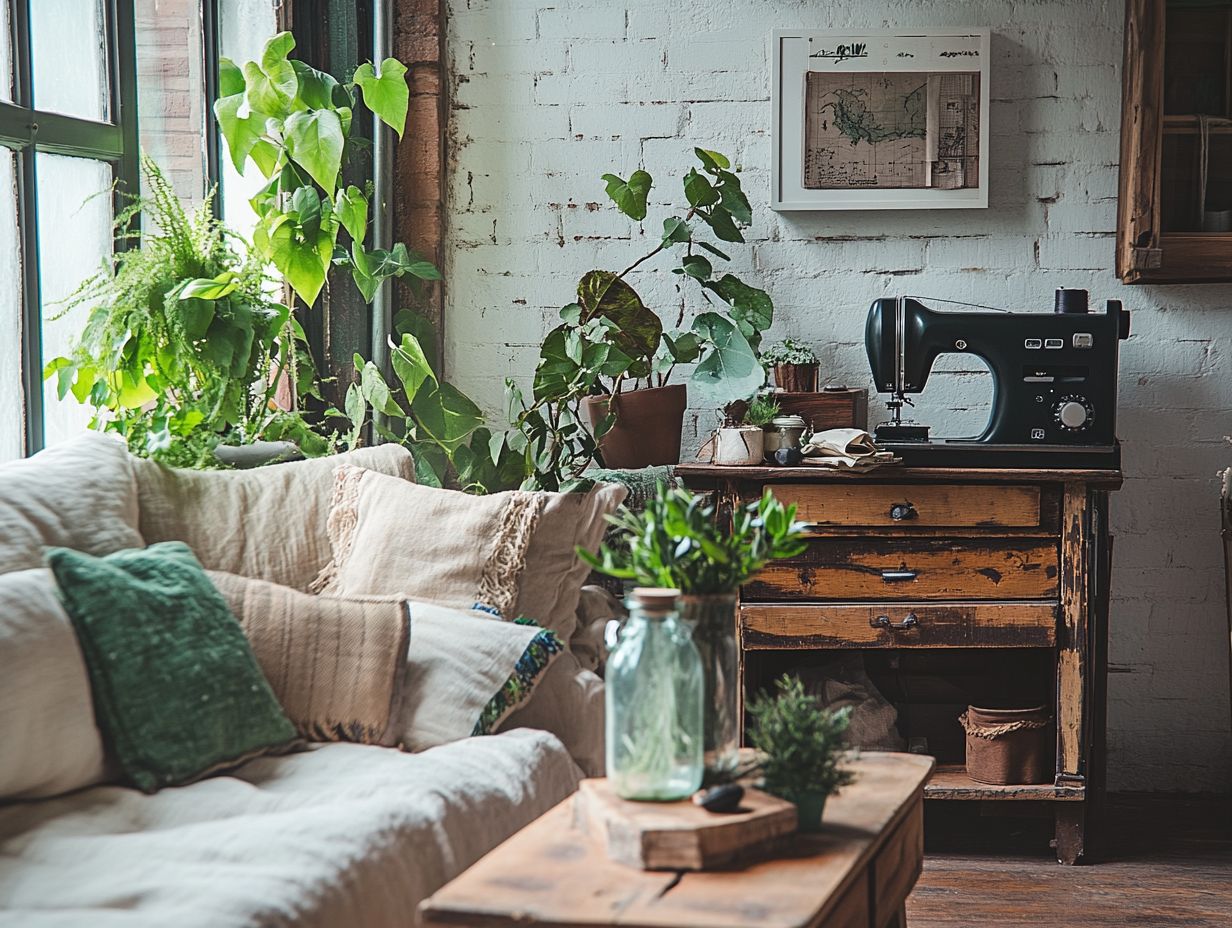
Engaging in DIY projects offers you a fulfilling opportunity to embrace a zero-waste lifestyle, empowering you to create functional and sustainable solutions from everyday materials.
Imagine crafting reusable bags and cloth towels or whipping up homemade detergent and eco-friendly cleaning products.
These projects not only help reduce waste but also encourage a hands-on approach to sustainable living. Use fabric scraps and essential oils to make items like bug spray and body lotion, showcasing your creativity while minimizing reliance on single-use items.
This practice builds community, as you share ideas and resources with others, amplifying the impact of the zero-waste movement.
Creating Homemade Cleaning Products
Creating your own cleaning products is not just practical; it s a smart, eco-friendly move toward a zero-waste home. By using simple ingredients like vinegar, baking soda, and essential oils, you can minimize waste while reducing your exposure to harmful chemicals often lurking in commercial cleaning supplies.
With a dash of creativity, you can easily whip up solutions like multi-surface cleaners, stain removers, and even laundry detergents directly from your kitchen pantry.
These ingredients are versatile and customizable, allowing you to personalize your creations by adding preferred scents or adjusting the strengths to match your unique preferences.
By opting for these DIY methods, you re not only saving money but also embracing a more mindful lifestyle. Choosing these greener alternatives supports sustainability and fosters a healthier living environment, demonstrating that effective cleaning can harmoniously align with eco-conscious choices.
Repurposing Items for Household Use
Repurposing items for household use is a brilliant way for you to minimize waste and embrace the principles of zero waste, turning discarded materials into valuable upcycled treasures.
Consider how glass jars can effortlessly transform into chic storage containers for spices or small craft supplies. Old wooden pallets? They can become cozy garden furniture or stylish shelving with just a bit of creativity.
By following tutorials that guide you through these projects, you’ll find that repurposing not only saves you money but also significantly reduces your ecological footprint.
Imagine turning outdated electronics into unique decor pieces or repurposing wine corks into bulletin boards; these examples showcase the endless possibilities that innovative recycling offers.
Engaging in such sustainable practices not only enhances your home but also fosters a sense of community, inspiring those around you to rethink what s truly disposable.
Start repurposing today and see the difference it makes!
Composting and Gardening
Composting and gardening are essential pillars of a zero-waste lifestyle. They provide sustainable ways to manage food waste while enriching soil health. By transforming organic scraps into nutrient-rich compost, you can significantly cut down on waste heading to landfills. Plus, you ll nurture a flourishing garden!
This practice minimizes waste and serves as a sustainable fertilizer source. It encourages a variety of plants and animals and promotes eco-friendly gardening techniques, which are methods that are kind to the environment, like using natural fertilizers. Engaging in composting and gardening allows you to cultivate a deeper connection with nature and fosters self-sufficiency within your community.
The benefits of these practices reach far beyond your personal garden; they contribute to healthier ecosystems overall. If you’re considering starting a compost bin, it s vital to include the right ingredients, such as:
- Green materials like vegetable peels
- Brown materials like dried leaves
These components break down effectively, accelerating the decomposition process. Integrating raised beds or container gardening can optimize space utilization, making gardening accessible even in urban settings.
By embracing these practices, you not only enrich your own garden but also play a crucial role in nurturing a greener environment for generations to come!
Reducing Food Waste

Reducing food waste is essential for achieving a zero-waste home. It calls for mindful consumption and inventive strategies to make the most of surplus food. Every little step you take in this direction contributes to a healthier planet and invites you to embrace innovative cooking techniques.
For example, consider incorporating the stems of leafy greens into your soups or transforming vegetable scraps into rich, flavorful stocks. These small adjustments can turn what might typically be discarded into delightful dishes!
You might also want to organize a weekly “clean-out-the-fridge” night, where leftover ingredients unite in a collaborative meal. This minimizes waste and ignites your culinary creativity.
Learning proper food storage techniques can significantly extend the life of your fruits and vegetables. This ensures they remain fresh for longer and supports your journey toward a sustainable lifestyle.
Tips for Maintaining a Zero-Waste Home
Maintaining a zero-waste home demands your commitment and creativity. Embrace practical strategies that align with sustainable living and eco-friendly choices. You can dramatically reduce your waste output by incorporating simple habits like consistently using reusable bags, opting for bulk purchases, and establishing a system for recycling and composting.
Budget-friendly practices, such as crafting homemade cleaning products and personal care items, not only cut down on waste but also save you money. Cultivating awareness and engaging with your community enhances the zero-waste movement. Inspire others to join your cause!
Ready to transform your lifestyle? Start today and contribute to a healthier planet!
Practical Strategies for Long-Term Success
Implementing practical strategies for long-term success in maintaining a zero-waste home means seamlessly integrating sustainable options into your daily life while keeping an eye on your budget. Establishing a routine that highlights reducing, reusing, and recycling can transform these practices into a lifestyle choice rather than a fleeting trend.
Regularly evaluating your household consumption patterns and exploring eco-friendly alternatives helps you meet your waste reduction goals. It also fosters a sense of community engagement within the zero-waste movement. Additionally, consider trying out 5 creative DIY projects to enhance home energy efficiency. This commitment builds resilience and ignites creativity!
One effective long-term strategy is to create a community exchange program, where you and your neighbors can share resources everything from tools to clothing. This way, you can cut down on unnecessary purchases and deepen your connections with those around you.
Hosting DIY workshops empowers everyone to learn how to make cleaning products or turn old items into something new and useful. Working together towards a common goal inspires positive habits in all participants.
Such initiatives underscore the importance of collaboration and support, ensuring that the movement remains vibrant and impactful well beyond your initial efforts.
Frequently Asked Questions
What are some DIY projects I can do to create a zero-waste home?
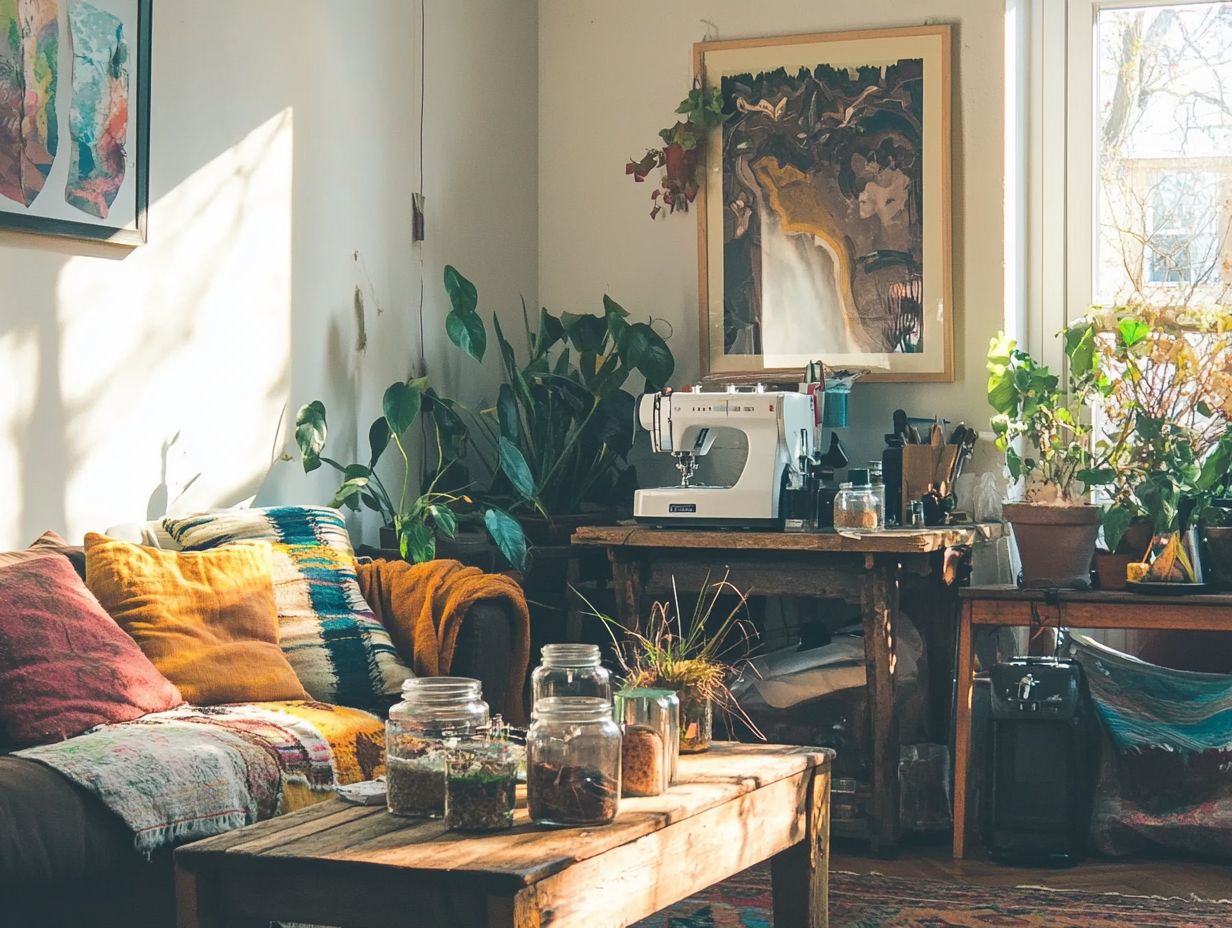
Some DIY projects to create a zero-waste home include making your own reusable cloth bags, creating a compost bin, and making homemade cleaning products using natural ingredients.
How can I make my own reusable cloth bags?
You can make your own reusable cloth bags by using old t-shirts or fabric scraps. Simply cut the fabric into the desired size and sew the sides together. You can also add handles using old belts or ribbon.
What are the benefits of creating a compost bin?
Creating a compost bin allows you to turn food scraps and yard waste into nutrient-rich soil for your garden. This reduces the amount of waste sent to landfills and helps your plants thrive.
What are some natural ingredients I can use to make homemade cleaning products?
Some natural ingredients for homemade cleaning products include vinegar, baking soda, lemon juice, and essential oils. These ingredients clean effectively and are better for the environment compared to harsh chemical cleaners.
How can I reduce waste in my bathroom?
You can reduce waste in your bathroom by making your own beauty and hygiene products, such as face masks, shampoo bars, and toothpaste. These DIY projects not only minimize waste but also give you control over the ingredients used on your body.
What are some tips for staying motivated to maintain a zero-waste home?
Stay motivated to maintain a zero-waste home by setting small achievable goals, finding a community of like-minded individuals, and reminding yourself of the positive impact you are making on the environment.
Start your zero-waste journey today!

